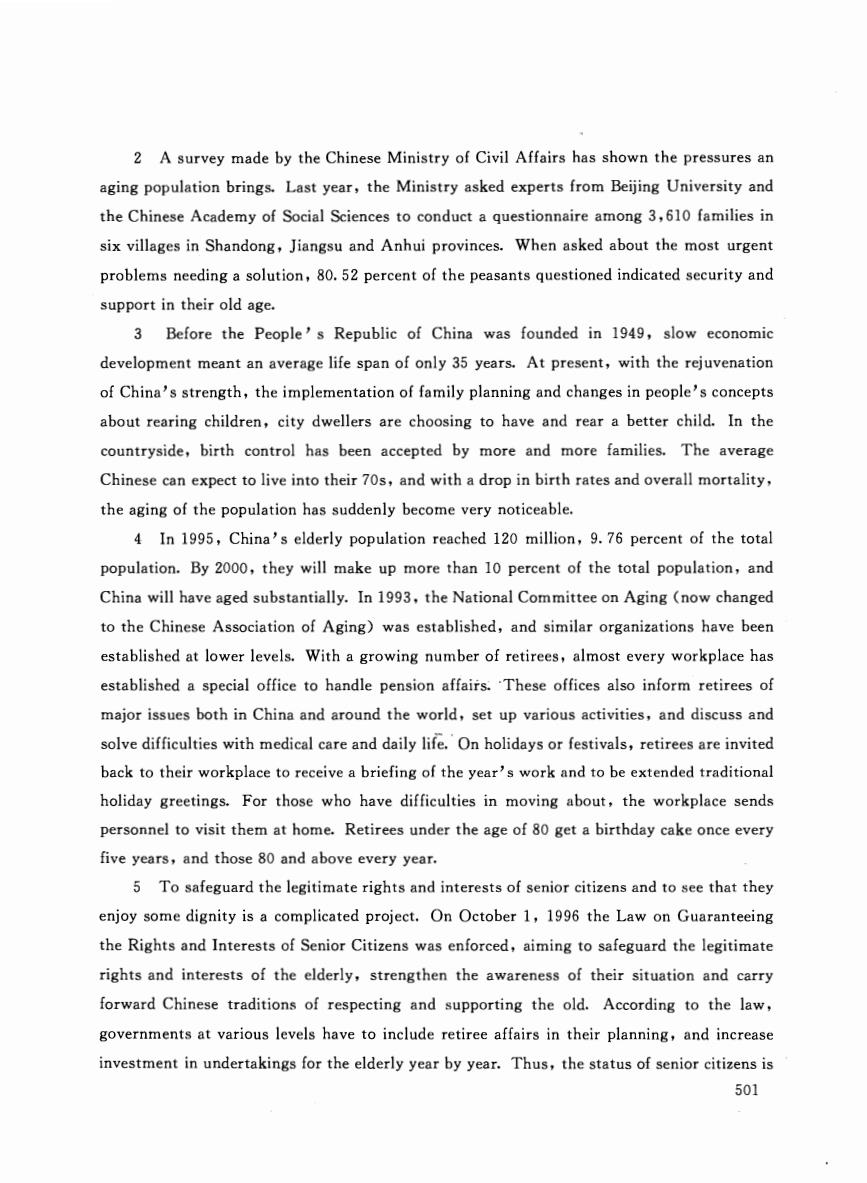正在加载图片...

2 A survey made by the Chinese Ministry of Civil Affairs has shown the pressures an aging population brings.Last year,the Ministry asked experts from Beijing University and the Chinese Academy of Social Sciences to conduct a questionnaire among 3,610 families in six villages in Shandong,Jiangsu and Anhui provinces.When asked about the most urgent problems needing a solution,80.52 percent of the peasants questioned indicated security and support in their old age. 3 Before the People's Republic of China was founded in 1949,slow economic development meant an average life span of only 35 years.At present,with the rejuvenation of China's strength,the implementation of family planning and changes in people's concepts about rearing children,city dwellers are choosing to have and rear a better child.In the countryside,birth control has been accepted by more and more families.The average Chinese can expect to live into their 70s,and with a drop in birth rates and overall mortality, the aging of the population has suddenly become very noticeable. 4 In 1995,China's elderly population reached 120 million,9.76 percent of the total population.By 2000,they will make up more than 10 percent of the total population,and China will have aged substantially.In 1993,the National Committee on Aging(now changed to the Chinese Association of Aging)was established,and similar organizations have been established at lower levels.With a growing number of retirees,almost every workplace has established a special office to handle pension affairs.'These offices also inform retirees of major issues both in China and around the world,set up various activities,and discuss and solve difficulties with medical care and daily life.On holidays or festivals,retirees are invited back to their workplace to receive a briefing of the year's work and to be extended traditional holiday greetings.For those who have difficulties in moving about,the workplace sends personnel to visit them at home.Retirees under the age of 80 get a birthday cake once every five years,and those 80 and above every year. 5 To safeguard the legitimate rights and interests of senior citizens and to see that they enjoy some dignity is a complicated project.On October 1,1996 the Law on Guaranteeing the Rights and Interests of Senior Citizens was enforced,aiming to safeguard the legitimate rights and interests of the elderly,strengthen the awareness of their situation and carry forward Chinese traditions of respecting and supporting the old.According to the law, governments at various levels have to include retiree affairs in their planning,and increase investment in undertakings for the elderly year by year.Thus,the status of senior citizens is 5012 A survey made by the Chinese Ministry of Civil Affairs has shown the pressures an aging population brings. Last year, the Ministry asked experts from Beijing University and the Chinese Academy of Social Sciences to conduct a questionnaire among 3 , 610 families in six villages in Shandong , ]iangsu and Anhui provinces. When asked about the most urgent problems needing a solution , 80.52 percent of the peasants questioned indicated security and support in their old age. 3 Before the People' s Republic of China was founded in 1949 , slow economic development meant an average life span of only 35 years. At present , with the rejuvenation of China' s strength , the implementation of family planning and changes in people' s concepts about rearing children , city dwellers are choosing to have and rear a better child. In the countryside , birth control has been accepted by more and more families. The average Chinese can expect to live into their 70s , and with a drop in birth rates and overall mortality , the aging of the population has suddenly become very noticeable. 4 In 1995 , China' s elderly population reached 120 million , 9.76 percent of the total population. By 2000 , they will make up more than 10 percent of the total population , and China will have aged substantially. In 1993 , the National Committee on Aging (now changed to the Chinese Association of Aging) was established , and similar organizations have been established at lower levels. With a growing number of retirees, almost every workplace has established a special office to handle pension affaiis. 'These offices also inform retirees of major issues both in China and around the world , set up various activities, and discuss and solve difficulties with medical care and daily life. On holidays or festivals , retirees are invited back to their workplace to receive a briefing of the year' s work and to be extended traditional holiday greetings. For those who have difficulties in moving about , the workplace sends personnel to visit them at home. Retirees under the age of 80 get a birthday cake once every five years, and those 80 and above every year. 5 To safeguard the legitimate rights and interests of senior citizens and to see that they enjoy some dignity is a complicated project. On October 1 , 1996 the Law on Guaranteeing the Rights and Interests of Senior Citizens was enforced , aiming to safeguard the legitimate rights and interests of the elderly , strengthen the awareness of their situation and carry forward Chinese traditions of respecting and supporting the old. According to the law , governments at various levels have to include retiree affairs in their planning , and increase investment in undertakings for the elderly year by year. Thus, the status of senior citizens is 501